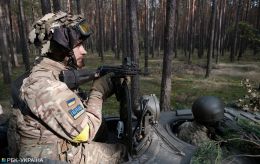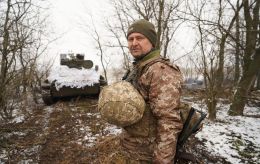Not Victory Day? Why Russia invented May 9 holiday
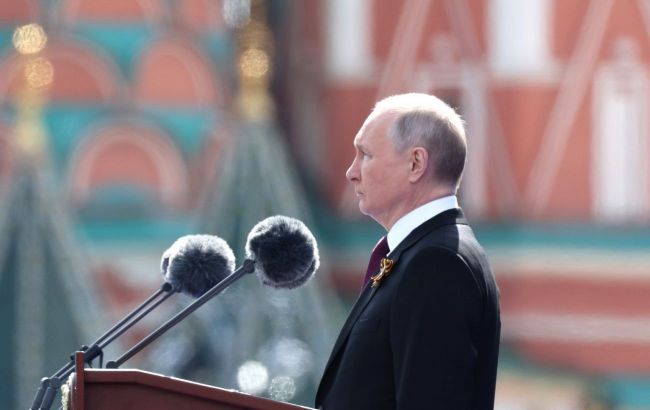 Photo: Vladimir Putin at a parade in Moscow on May 9, 2023 (kremlin.ru)
Photo: Vladimir Putin at a parade in Moscow on May 9, 2023 (kremlin.ru)
Russia continues to celebrate the victory over Nazism in World War II on May 9. Moreover, it has recently turned Victory Day into a cult of war and a propaganda tool, justifying aggression against Ukraine and threats to the "collective West."
Why Russia celebrates May 9, why Ukraine has abandoned this date, and when the Russian "victory frenzy" will end, read in the RBC-Ukraine article.
Sources: Wikipedia, Ukrainian Institute of National Remembrance, and comments by Roman Kabachiy, senior researcher at the National Museum of the History of Ukraine in the Second World War.
Contents
- Victory Day in Europe: Different dates and names
- Russia vs Ukraine. How victory was celebrated and what are the differences
- How Moscow turned victory into a cult
- How long will the "victory frenzy" last? When Russia will get rid of it
Victory Day in Europe: Different dates and names
European countries celebrate the victory in World War II in Europe on different dates in May and under different names. Denmark and the Netherlands celebrate Liberation Day on May 5. But most countries have chosen May 8.
Norway celebrates Veterans Day, while Lithuania, Latvia, and Estonia celebrate Remembrance Day. The public holiday in France is called Victory Day (Victoire 1945), and in the UK it is called Victory in Europe Day. In 2015, Poland moved the celebration from May 9 to May 8 and now celebrates it as National Victory Day.
Ukraine inherited Victory Day on May 9 from the USSR, and it was celebrated until 2015. From 2016 to 2023, the Day of Victory over Nazism in World War II was officially celebrated, established as part of the decommunization package of laws.
Last year, President Volodymyr Zelenskyy signed a decree on May 9 to celebrate Europe Day and also submitted a bill to the Verkhovna Rada that would have May 8 as the Day of Remembrance and Victory over Nazism in World War II (1939-1945). The law was passed in late May and signed into law in June. Thus, yesterday, Ukraine celebrated May 8 as the Day of Remembrance and Victory for the first time.
Russia and Belarus continue the Soviet tradition and celebrate on May 9. In Russia, it has become a propaganda tool, when the so-called ''pobedobesie", or "victory frenzy," overshadows honoring veterans, and instead of realizing all the horrors of the deadliest war, there are calls such as "On to Berlin!" and "We can do it again."
The reason for the date differences is politics. In May 1945, Soviet dictator Joseph Stalin insisted that Germany unconditionally surrender to the USSR.
"The Soviet Union wanted Germany to sign this document separately. When it was signed, it was already May 9, Moscow time," explained historian Roman Kabachiy.
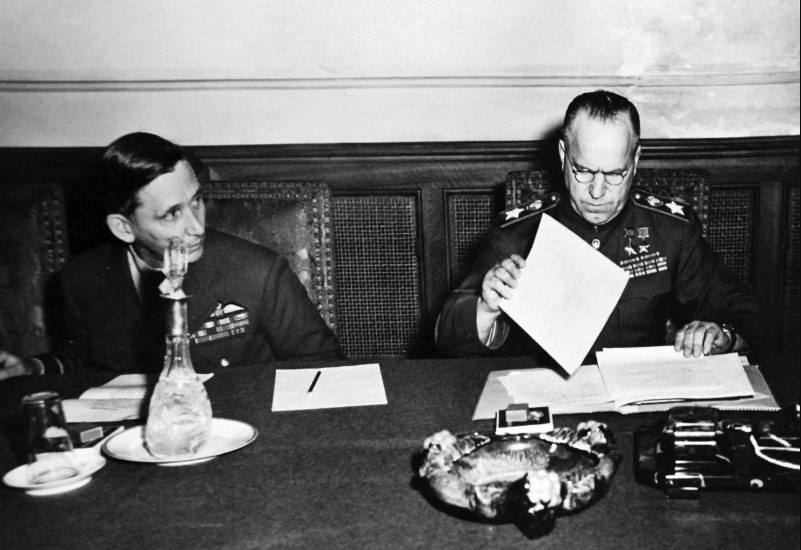
Photo: Arthur Tedder, Commander of the Royal Air Force of Great Britain, and Georgy Zhukov, Deputy Supreme Commander of the Soviet Armed Forces, re-signing the Act of Surrender of Germany on May 8, 1945 (Courtesy of the Library of Congress Collection)
After the suicide of Adolf Hitler (April 30, 1945), Germany was led by Grand Admiral Karl Dönitz. He initially offered partial surrender in the northwest, Denmark, and the Netherlands. The initial surrender took place on May 4. British Field Marshal Bernard Law Montgomery signed it on behalf of the Allies and it came into force the next day.
On May 7, at 02:41 a.m., American commander Dwight Eisenhower accepted the unconditional surrender of the entire Wehrmacht with the participation of the Soviet representative, General Ivan Susloparov. Stalin refused to recognize the act and demanded that a new one be signed in Berlin, which was controlled by the Red Army.
The British and American leaders, Winston Churchill and Harry Truman, refused but eventually agreed after Stalin said that the surrender should be accepted where the aggression came from, in Berlin.
The second act was signed in the Berlin suburb of Karlshorst on May 8 at 22:43 CET or May 9 at 00:43 Moscow time. Its text almost word-for-word repeated the previous one. For example, it confirmed the ceasefire on May 8 at 23:01 (CET).
Russia vs Ukraine. How victory was celebrated and what are the differences
The Victory Day holiday in the Soviet Union was established on May 8 before the signing of the Second Act. By a decree of the Presidium of the Supreme Soviet of the USSR, May 9 was declared a day of national celebrations and a day off.
However, there were no special celebrations on May 9, 1945. The first parade was held in Moscow by Stalin's order only on June 24. In the following years, there were no parades or marches of veterans on Red Square. In 1947, the status was changed - the holiday remained public but became a working day. At the same time, the government canceled payments and benefits for veterans.
Until 1965, May 9 was not a day off, but certain events were held. Artillery salutes were fired in the capitals and the Soviet republics, and congratulations on Victory Day were published on the front pages of newspapers. There was certain attention to the date, although Labor Day on May 1 and the anniversary of the October Revolution on November 7 were celebrated on a much larger scale.
"The celebrations began on a pathos level already in the time of Leonid Brezhnev, because, for example, the anniversary of the Revolution was already leaving the mass consciousness. The Soviet Union clearly wanted to create a myth that would cover the bitter truth about the war. They wanted to hide the dark side of the war and create a cheerful victory holiday," Kabachiy says.
Victory Day became a public holiday again in 1965. At that time, the 20th-anniversary parade was held. It was the second parade after the war ended. The third took place in 1985, and the fourth in 1990. The Victory Parade has been an annual event in the Russian Federation since 1995.
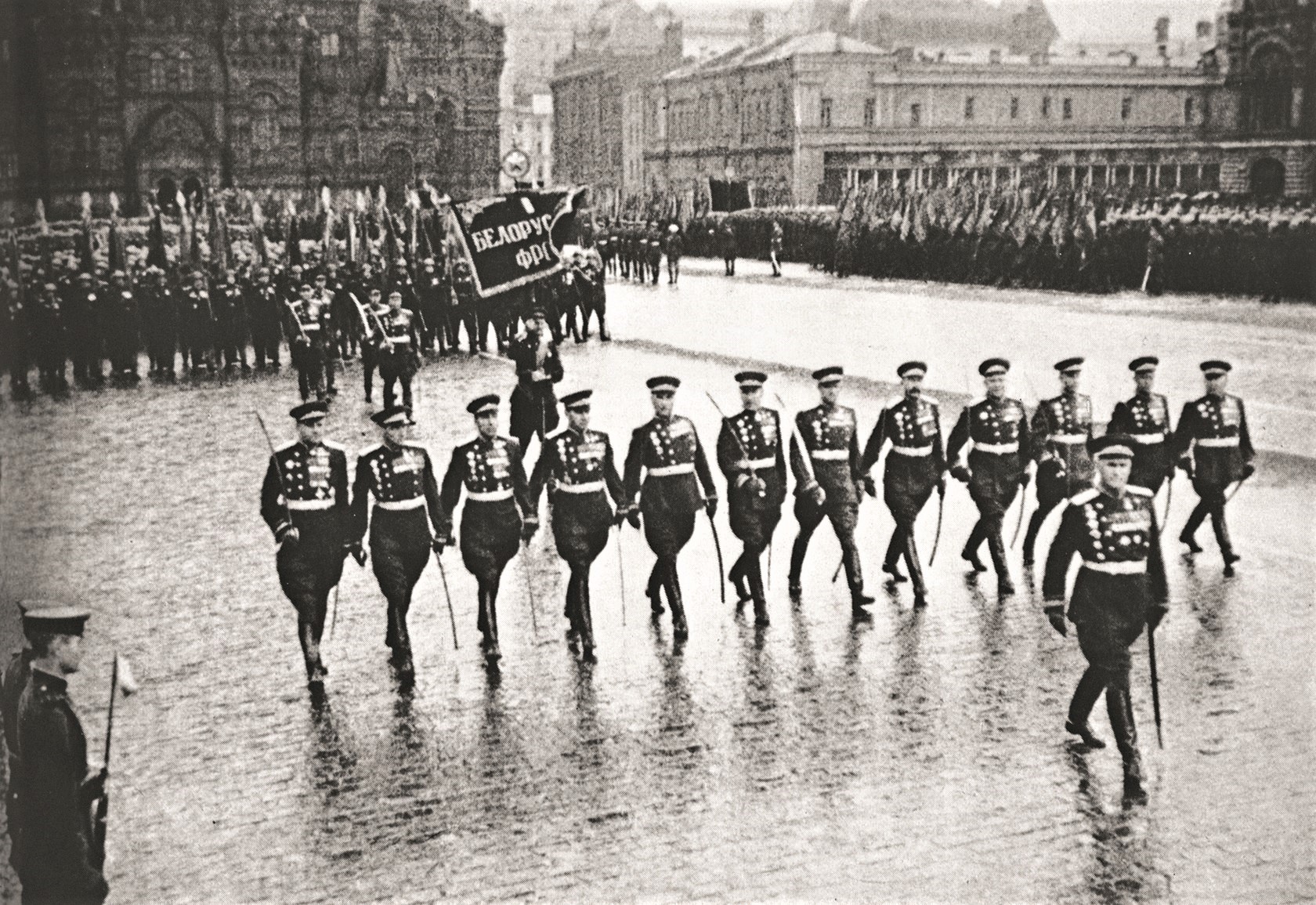
Photo: The first postwar parade in Moscow, June 24, 1945 (mil.ru)
Ukraine had no tradition of May 9 military parades either in Soviet times or after independence. Until the late 1960s, two parades were held annually in the Ukrainian SSR on May 1 and November 7. Unscheduled ones were organized on Khreshchatyk in Kyiv on special occasions. For example, in June 1934, when the capital was moved from Kharkiv, or in 1954, on the 300th anniversary of the "reunification" with Russia.
There were also no May 9 parades in Ukraine on anniversaries under the USSR. For 20 years after the war, Ukrainians celebrated the holiday privately: veterans in the family circle, cautiously recalling certain episodes of trench truth, while relatives of the dead were commemorating the fallen.
The memorial events consisted of laying flowers at the monuments to the Unknown Soldier and a minute of silence on TV and radio. The most touching moments were far from official - people thanked veterans and gave flowers right on the streets.
"For me, the most touching moment was when women veterans hugged each other in my village in the Kherson region. Their sincere hugs said "We have survived all this and are living now". And all the pompous speeches are just for show. It's the same now, when in Russia, after the Immortal Regiment campaigns, portraits of war veterans are thrown into the trash," the historian told RBC-Ukraine.
Independent Ukraine celebrated May 9 the same way as before for the first decade and a half. Under (third President - ed.) Viktor Yushchenko, a format was introduced with a march of veterans along Khreshchatyk with the presidential orchestra and a rally concert. During these events, there was a nationwide minute of silence.
Military equipment first appeared on the May 9 parade in 2010 under (fourth president - ed.) Viktor Yanukovych. There was also an attempt to oblige using the red flag of victory at the state level, but the bill was declared unconstitutional. Until 2014, the St. George's ribbon was used as a symbol, but after it became a symbol of Russian aggression, it was replaced by the red poppy. Later, the holiday was celebrated in Ukraine with thousands of rallies, prayer services, car rallies, etc.
How Moscow turned victory into a cult
After the 1960s, May 9 became the main holiday in the Soviet Union. The Communist Party and General Secretary Brezhnev personally began to actively exploit the theme of the great victory as part of raising the authority of the ruling elite in society, the Ukrainian Institute of National Remembrance notes.
Gradually, the memory of World War II turned into a cult. In modern Russia, the myth of the Great Patriotic War remains the only marker of identity with the absence of other more significant achievements. The modern commemoration of events, images, and personalities of the past, often imbued with grotesqueness and profanation, is called "pobedobesie."
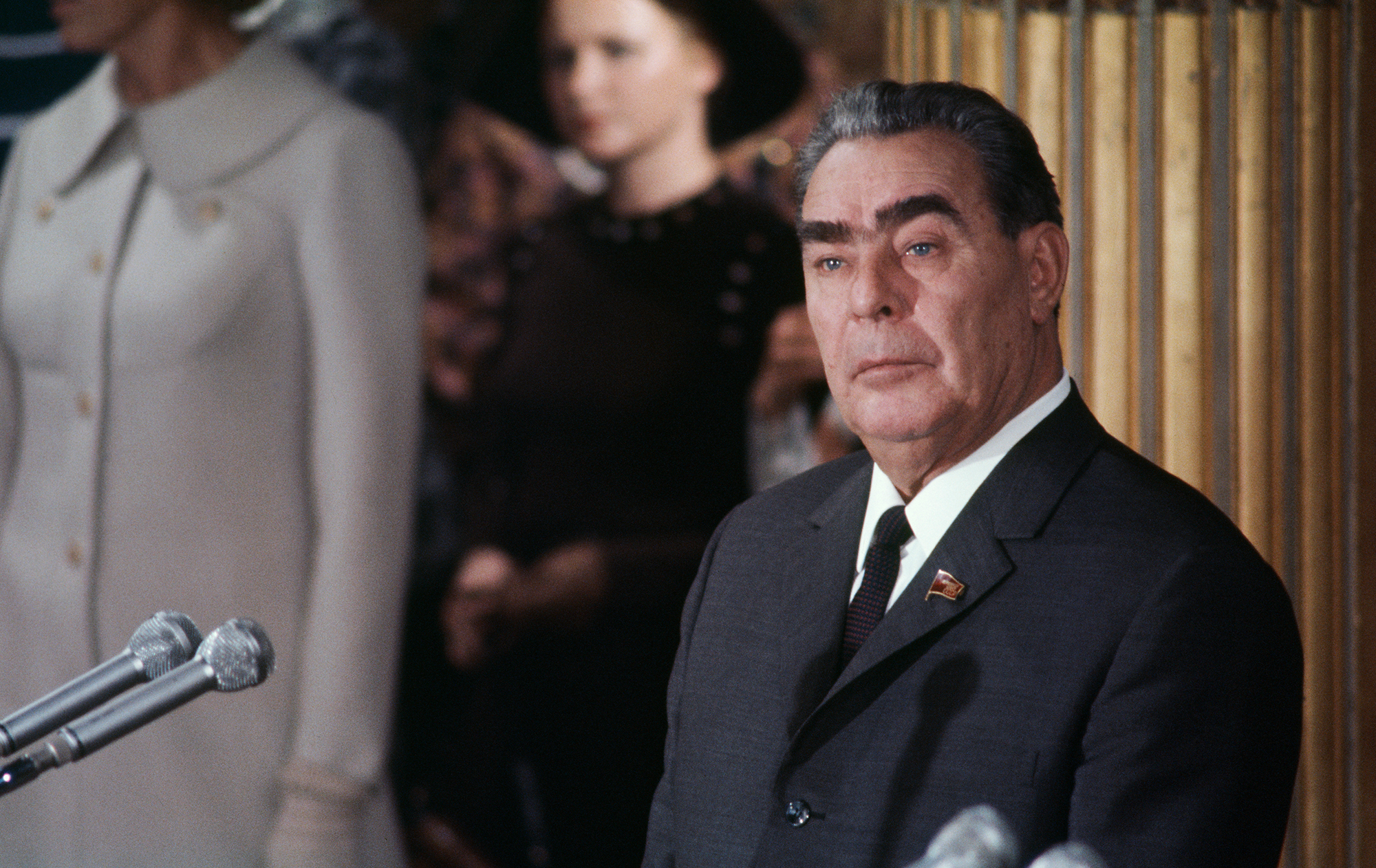 Photo: May 9 became the main holiday of the USSR under Leonid Brezhnev (Getty Images)
Photo: May 9 became the main holiday of the USSR under Leonid Brezhnev (Getty Images)
Under Vladimir Putin, especially since 2014, it has become clear that Moscow is using the memory of the war as a way to mobilize in a revanchist and aggressive military tone. Unlike Ukraine, where the European slogans "Never again" and "We remember and we prevail" have taken root. Recently, a model of respect has become increasingly popular in Ukrainian society - less pathos, more human.
Before Putin, there were few working value ideas in Russian society. The memory of the Second World War was one of them, which neither nationalists, liberals, nor conservatives could question. But it was with his coming to power that the victory over Nazism turned into a propaganda tool. Ignoring Soviet totalitarianism, the human dimension of the war and its victims.
Why is the perception so different? According to historian Roman Kabachiy, the reason is that the entire territory of Ukraine was under German occupation, while Russia's territory was only a few percent of the European part.
"Russians do not know what occupation is. Villages were not burned there as they are here, and Russians have not seen the scorched earth tactics. The Dnipro hydroelectric power plant, Khreshchatyk, factories, and so on were blown up by both the Red Army and the Germans during the retreat. That is why Russians had a different attitude to this war since the very beginning. That's why for us 'Never Again' is not just a sound," he explained.
In his opinion, Ukraine's transition to celebrating the Day of Remembrance and Victory over Nazism on May 8 is far from being away from the aggressor and closer to Europe.
"World War II is a separate page in the history of Ukraine. Every year we discover something new. And we approach the Second World War with a desire to understand and realize, not with 'our grandfathers fought' or something else. Because when our grandfathers fought, they were thrown into battle, including unarmed, as they did with the same Black Infantry (mobilized to the Red Army from the territories previously occupied by the Nazis - ed.) We look at it differently," he added.
Today, Russian propaganda is actively cultivating its myths, spreading them not only within its own country but also in the former Soviet republics, in Europe, and around the world. The aggressor is using the victory and its alleged exceptional role in it as an indulgence to commit mass crimes in Ukraine and to seize it.
The myth of Moscow's allegedly exceptional role is shattered by the hard facts. More than 6 million Ukrainians fought the Nazis in the ranks of the USSR army, more than 100,000 fought them as part of the UPA, and tens of thousands more in military units in Poland, the United States, Canada, and France.
Ukraine's direct human losses in World War II are estimated at more than 8 million people. The well-known crimes of the Nazis - the Holocaust, executions of civilians, and deportations - took place, in part, on the territory of Ukraine.
How long will the "victory fenzy" last? When Russia will get rid of it
The current Russian perception of the victory over Nazism is a banal misunderstanding that war is evil.
"To have the nerve to shout 'On Berlin!' in Berlin itself is psychosis and a cult of war, a mixing of good and evil. Cultivating victory delusions in kindergartens means not understanding that tomorrow your child will die in the war in Ukraine, where Putin will throw him or her," Kabachiy said in an interview with RBC-Ukraine.
According to the historian, this will continue until the Russians get rid of the centuries-old imperialism. Until their "cozy state" is limited to a few regions around Moscow, and the enslavement of the colonized peoples of the Caucasus, Siberia, the Urals, and other regions stops.
"I don't know if this imperialism will disappear during our time... Most likely, there needs to be a split of Russia, forming a Russian state, not a multinational cocktail with Evenkas, Buryats, and Ingush. Then the Russians will feel that they are not a big brother, but just one of the nations. When they feel this, the veil of imperialism and 'pobedobesie', or 'victory frenzy,' will disappear," the historian added.
